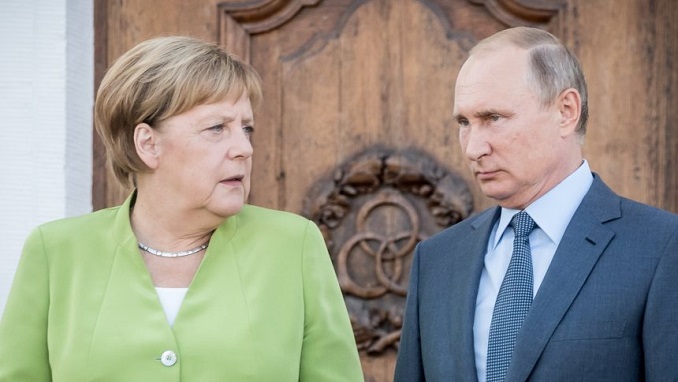Germany is under tremendous pressure from the United States, which demands Berlin revise its energy policy towards Moscow, Russian Foreign Ministry Spokeswoman Maria Zakharova said on Sunday, TASS informs.
“Obviously, it is a colossal pressure over energy matters. When day after day the US ambassador in Berlin threatens the German people and government demanding they revise the energy policy towards Russia, make a choice in favor of US energy sources, abandoning mutually beneficial cooperation with Russia,” she said in an interview with the Vecher (Evening) with Vladimir Solovyov program on the Rossiya-1 television channel.
DPA reported on June 2 citing the press secretary of the US embassy in Berlin that Ambassador Richard Grenell had resigned after two years in office. Grenell’s role in building the US-German relations is seen as questionable in Germany as he has been accused of meddling with Germany’s domestic affairs. Thus, in mid-January 2019, the US diplomat reportedly circulated letters to German companies warning them of possible sanctions in case they continued to work on the Nordstream-2 project.
On Thursday, a group of US senators submitted a bill that would expand the U.S. sanctions against the Nord Stream 2 gas pipeline. According to Bloomberg news agency, the new sanctions will be imposed on the insurance companies that work with Russian vessels on completion of the project.
Klaus Ernst, chairman of the Bundestag’s committee on economic affairs and energy, told TASS earlier Germany and the European Union should think about steps to be taken in response to the United States’ plans to expand the sanctions against Nord Stream -2. “The United States’ actions on that matter should not be taken as an act of friendship any longer, as they rather constitute interference into Germany’s and the EU’s sovereignty,” he said.
Nord Stream-2 is an international project for the construction of a gas pipeline that will run across the bottom of the Baltic Sea from the Russian coast to Germany bypassing transit states, such as Ukraine, Belarus, Poland and other Eastern European and Baltic countries.
The new 1,200 kilometer pipeline, basically following the same route as Nord Stream, will traverse economic zones and territorial water of five countries, namely Russia, Finland, Sweden, Denmark, and Germany. The pipeline’s capacity will be 55 billion cubic meters of gas a year. The project is 93% completed to date.
Nord Stream 2 AG is the operator of the pipeline construction. Its sole stakeholder is Russia’s gas giant Gazprom. Gazprom’s European project partners are Germany’s Uniper and Wintershall, Austria’s OMV, France’s Engie, and Royal Dutch Shell (the UK and the Netherlands).
The Switzerland-based Allseas, which laid pipes for the Nord Stream 2 pipeline, suspended its pipelay activities and withdrew vessels involved in the project due to the threat of the US’ sanctions in late December 2019.
Gazprom CEO Alexei Miller said earlier that Russia would be able to finish the construction of Nord Stream-2 on its own as there were no technological obstacles requiring external assistance. In January, President Vladimir Putin said that the construction will be completed and the gas pipeline will be launched before the end of this year or in the first quarter of next year.












